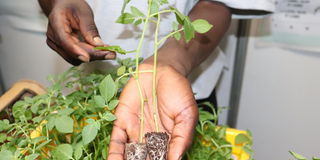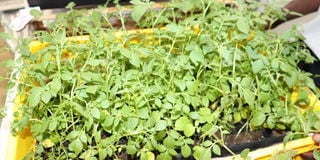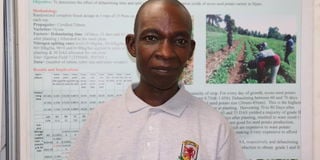Biz Lounge: How I struck gold as a potato farmer in Molo

Some of the apical cuttings used to produce clean potato seed.
Ten years ago, Richard Mbaria was a dedicated maize farmer. All was well until the day he decided to compare his profit margin with that of the potato farmers around him.
"I was a maize farmer for four years and when I realised that I was only making a paltry Sh30,000 per acre as profit per year, while my neighbours who were potato farmers were making over Sh100,000 per season (after 3-4 months), I decided to switch to ware potatoes (for consumption) in 2016," says Mr Mbaria from Elburgon, Molo sub-county.
"For two years, I suffered from the challenge of accessing certified seeds - which caused me to skip seasons altogether - not to mention the plant diseases I had to contend with as I sourced seeds from neighbours, the market and even used degraded saved seeds," he said.
To get to where he is now, it took a lot of convincing to even think of seed potato production (rooted apical cutting) as a business.
Through training and consultations with experts from Egerton University under the Seed Potato Programme, Mr Mbaria's perspective began to change. He realised that this niche market could be a viable business opportunity.
"Through the nudges and challenges I faced as a ware potato farmer, I took a leap of faith and invested Sh100,000 in the business on a quarter of an acre in 2018. After the COVID 19 break, I expanded to one acre in 2021, which gave me a return of Sh600,000 in the season," he says.

Some of the apical cuttings used to produce clean potato seed.
The money, he says, helped him build a store to store his seeds to improve post-harvest germination on the farm. In 2022, he expanded seed potato production to three acres of his farm and used the income to build a 5 x 9 metre greenhouse to grow the rooted cuttings.
His biggest challenge came when all his seed potatoes died, and he was so disappointed that he wanted to close down the business and go back to what he'd been used to - ware potato farming.
"I hit rock bottom when I lost all my plants. I was so disappointed that I almost closed the business. I took a year off to recover from the loss, but I kept thinking about the investment I'd already made. I decided to try again. Fortunately, this second attempt was successful and I'm so glad I didn't give up," he says.
He also mentions the financial challenges he faced in obtaining the licence and seed certification from the Kenya Plant Health Inspectorate Service (KEPHIS).

Richard Mbaria, a potato farmer from Molo.
Despite these challenges, Mr Mbaria has found ways to make his business sustainable. He offers training services to individual farmers and farmer groups, charging Sh1,000 per day. He also sells potato seed at Sh3,000 for a 50kg bag.
As he continues to navigate the complexities of his business, Mbaria remains optimistic that he will be able to fully utilise the capacity of his greenhouse. He is currently producing between 1,000 and 5,000 apical cuttings against a potential of 40,000 cuttings.
As well as increasing his production, he is actively influencing his community by encouraging other farmers to become seed producers, with the aim of collectively improving the quality, quantity and productivity of potato seed in the region.
"There's a huge market opportunity for anyone considering this business. There is a huge shortage of clean seed potatoes. The key is to maintain good relationships and build trust with farmers. If you can do that and provide expert advice, you'll be successful," he said.


